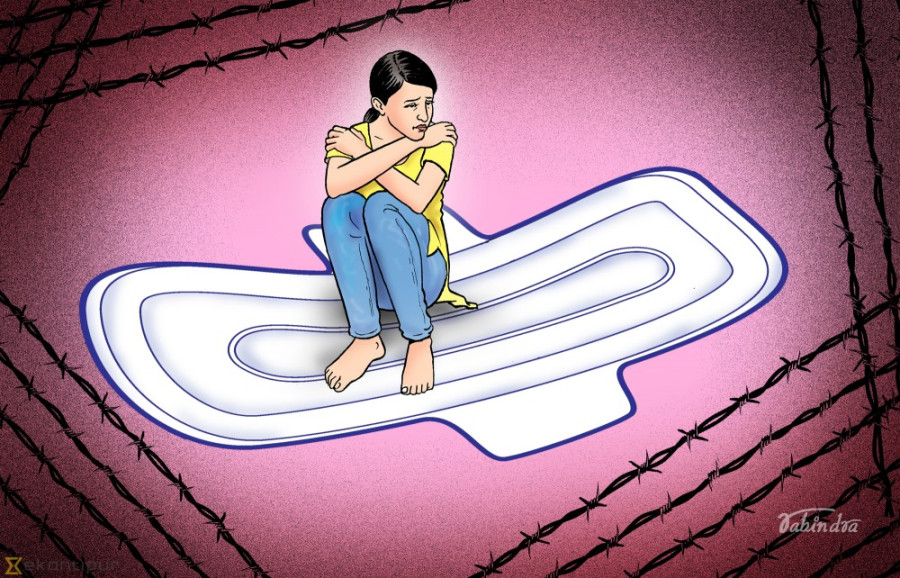National
Involving men in eliminating taboos surrounding menstruation
As menstrual stigmas have largely been put in place and supported by men, their participation in uprooting these taboos is critical, gender rights activists say.
Elisha Shrestha
Fourteen-year-old Indira’s biggest fear is getting a stain on her clothes while on her period. Even if there is a stain due to overflow, the ninth-grader makes sure to change her clothes before anyone notices, especially men.
“Once, at school, when I found out that there was a bloodstain on my white skirt, I tried to cover it up by pouring blue ink on it,” said Indira, who asked to be identified only by her first name. “But my male classmates saw me doing that and made fun of me. I was very embarrassed.”
At home too, Indira has never discussed menstruation issues with the male members of her family.
“I feel like it’s a girl’s problem. So I feel shy,” she said.
When she gets her period, she subtly informs her mother, who then informs her father and brother by saying that she has become ‘na chune’—basically untouchable for the duration of her menstrual period.
Menstruation continues to remain taboo in Nepal and not just in rural areas where the practice of Chhaupadi persists. Chhaupadi is the practice of banishing menstruating women to sheds to live in isolation. It is highly prevalent in the far-western districts of Nepal despite being outlawed in 2005 and criminalised in 2017 and continues to kill women each year. Even in urban areas and in educated households, social ostracisation in the form of ‘na chune’ remains.
According to gender rights activists, the primary reason why such outdated practices continue is the fact that Nepal remains very much a patriarchal society and, hence, it is the male aversion to menstruation that needs to be addressed.
Bhawana Bogati, community health programme associate at Possible Heath in Achham, said that since menstruation is rarely addressed by including men, they often lack knowledge and understanding regarding the topic.
“It is a challenge for most boys and men to understand menstruation because of the secrecy surrounding it and the limited information they have access to, much of which can even be inaccurate,” said Bogati.
Since no one talks to boys and young men about menstruation, they end up observing social practices at home and internalise the behaviour as normal, said Ashwin Karki, an activist for dignified menstruation and coordinator of Amnesty International Nepal’s Barahi Youth Network.
“In reality, it is a form of violence against women,” said Karki. “The restrictions imposed on women are designed to dominate them and lower their self-esteem.”
Even in school, menstruation is not openly discussed and although there are lessons related to reproductive health and mensuration in the eighth-grade health textbook, the topic is rarely discussed at length, with most teachers choosing to gloss over the subject due to their own embarrassment.
Dismantling deep-rooted practices such as chhaupadi requires the active participation of men, said Bogati, who once used to practise chhaupadi herself.
“Men in my family neither objected nor encouraged us from practising chhaupadi,” she said. “I used to practise it simply because I didn’t want to be blamed if something bad happened in the family.”
Oftentimes, men don’t even know the proper condition of the chhau goths as they never have to stay in them. The chhau goths are basically animal sheds with no protection from the elements. They lack toilets or kitchens, which has even led to women’s deaths from suffocation. They are dirty, unhygienic and dangerous, said Bogati.
If men are incorporated into getting rid of the stigma surrounding menstruation, they will also be able to recognise the insidious ways in which a patriarchal society tries to keep women in line with the threat of ostracisation. Women are often blamed when things go wrong in the family, and ‘polluting’ sacred spaces or household deities while menstruating is considered a grave sin. Menstrual taboos, thus, fit into a wider pattern of how the patriarchal structure of society tries to keep women down.
Educating men can lead them to change their ways and realise that with sanitary products and the adoption of proper hygiene, menstruation is no different from any other bodily function.
“After marriage, I stopped practising chhaupadi and my husband supports my decision,” said Bogati. “Although I was vocal about the menstruation rights of women before marriage, I never got the kind of support from my family that I am getting from my husband.”
Karki also said that ever since he started openly discussing menstruation with his mother and sisters, they too feel comfortable talking to him.
“Menstruation and menstrual hygiene should be discussed openly between men and women,” he said.




 14.12°C Kathmandu
14.12°C Kathmandu (1).jpg)















